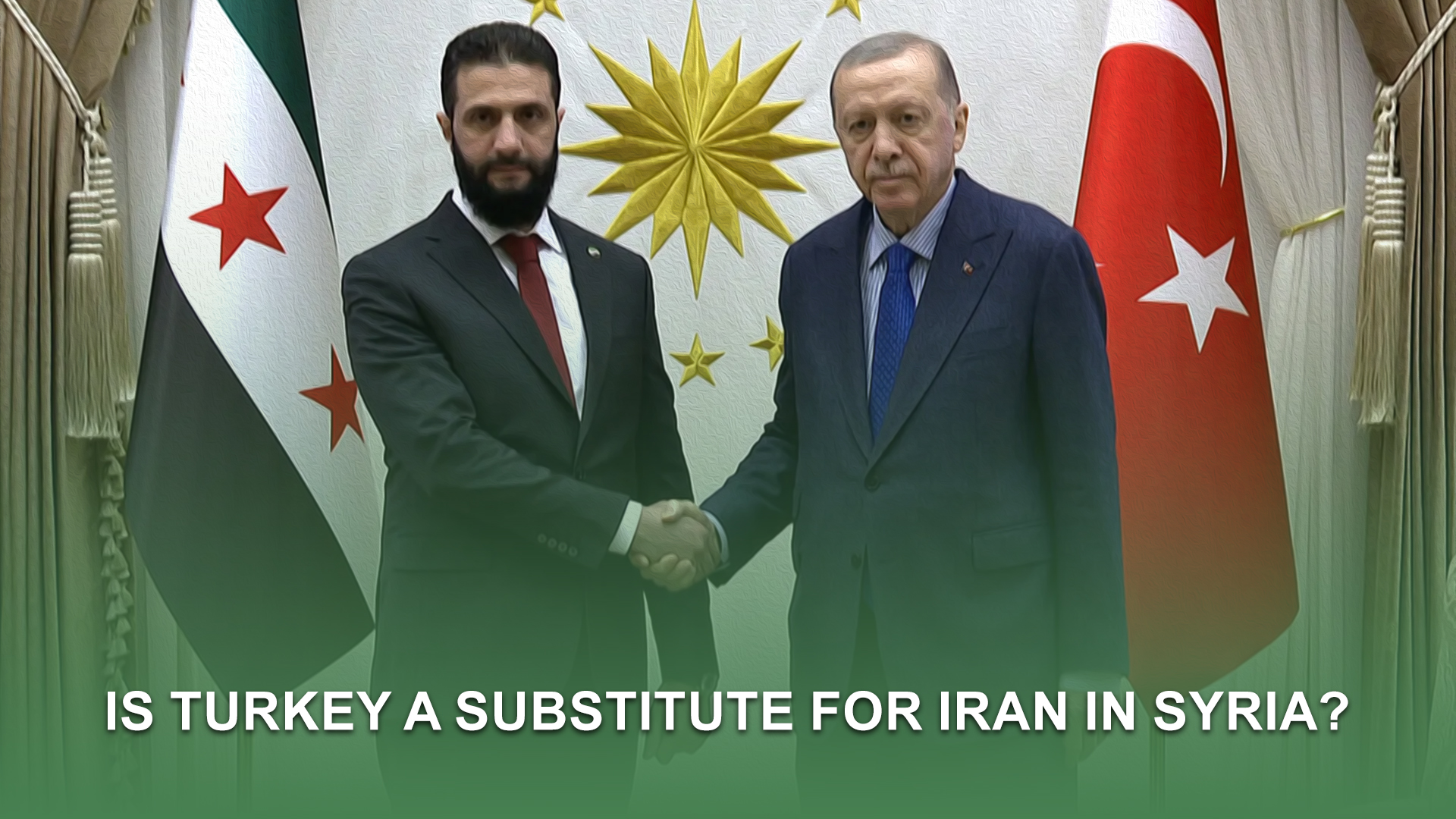Amid the New Power Struggle and the Inevitability of Resolving the Kurdish Issue, is Turkey a substitute for Iran in Syria?
Walid al-Shekh

Since the outbreak of the conflict in Syria in 2011, Iran has played a crucial role in supporting Bashar al-Assad regime, allowing it to consolidate its military, economic, and political influence in the country. However, Iranian power has come under increasing pressure as a result of economic sanctions, frequent Israeli attacks on its military sites in Syria, and increasing international diplomatic pressure. In contrast, Turkey has begun to strengthen its presence inside Syria through direct military interventions, making it a major player in the Syrian scene. But the most important question today is: Can Turkey replace Iran in Syria? Even if we assume this happens, what are the potential repercussions for the country’s future?
Turkish influence… from supporting the opposition to military incursions
Since the beginning of the Syrian crisis, Turkey has adopted a policy of supporting armed factions opposed to the Syrian regime, believing that the fall of Assad regime would create a regime friendly to it. As the conflict became more complex and the Syrian regime continued to rule, Turkish policy adapted, moving toward strengthening its military presence in northern Syria, under the pretext of protecting its national security from the Kurdish threat represented by the People’s Protection Units (YPG), which Turkey considers an extension of the Kurdistan Workers’ Party (PKK).
The past few years have witnessed several Turkish military operations in Syria, through which it occupied Syrian territory, such as the operation called “Euphrates Shield” (2016), “Olive Branch” (2018), and “Peace Spring” (2019). These operations were not limited to targeting the Kurds only, but also strengthened the influence of armed factions loyal to Ankara, leading to the formation of an unofficial Turkish administration in the areas they controlled. For example, the Turkish lira was introduced into circulation, and schools and service institutions affiliated with the Turkish regime were established, in what some consider a “Turkification” policy aimed at integrating these areas within the long-term Turkish influence.
Comparison between Iranian and Turkish influence
Although Iran and Turkey compete for influence in Syria, their methods differ fundamentally in the following points:
- The ideological approach: Iran relies on spreading Shiite ideology by supporting militias loyal to it, while Turkey uses Sunni groups as a tool of its influence.
- Military presence: Iran relies on militias such as Hezbollah and the IRGC, while Turkey relies directly on the Turkish army and the armed factions allied to it.
- Administrative control: Iran seeks to integrate its allies into Syrian state institutions, while Turkey is working to establish local administrative entities linked to it economically and politically.
Risks of Turkish Iinfluence in Syria
- Undermining Syrian sovereignty: Ankara has made no secret of its intention to control northern Syria. It has began implementing policies aimed at imposing a long-term presence, whether through the resettlement of Syrian refugees or through cultural and economic influence.
- Clashing with the Kurds: The Turkish-Kurdish conflict poses a major obstacle to any future stability in Syria. Turkey considers the Kurdish forces a threat to its national security, while these forces seek recognition of their political, administrative, and cultural rights.
- Confronting international powers: The Turkish intervention puts Ankara in direct confrontation with other powers, such as Russia, Iran, and even the United States, particularly Israel, complicating the possibility of reaching a comprehensive political settlement.
- Prospects for Turkish expansion: There are concerns that Turkey does not plan to withdraw from Syria in the near future, but rather seeks to expand its regional influence within the framework of a long-term Turkish expansionist policy.
The Kurdish issue is a key to regional stability
Of all the issues impeding a resolution to the Syrian conflict, the Kurdish issue remains the most complex and influential on the future of Syria and the region in general. The Kurds, who constitute a large part of the population of northeastern Syria, played a major role in fighting ISIS and received international support, especially from the United States. However, their legal and political status inside Syria remains unclear, as they face rejection from both the Syrian regime and Turkey.
Turkey, which considers any form of Kurdish autonomy a threat to its security, has carried out several military operations to prevent the Kurds from establishing an independent entity in northeastern Syria. It always seeks to thwart the project of a democratic nation, which undermines any authoritarian rule. However, this policy has only led to further complexity of the crisis.
Failure to find a solution to the Kurdish issue poses a threat not only to Syria, but to the entire region. The continuation of the Turkish-Kurdish conflict could lead to:
- Continued military escalation in northern Syria, hindering reconstruction efforts.
- Undermining the chances of reaching a comprehensive political settlement to the Syrian crisis.
- Fueling new conflicts extending to Iraq, Turkey, and Iran, where there is a Kurdish people demanding their rights.
Along with the Kurdish issue, the Palestinian issue also remains an influential factor in the policies of regional powers, including Turkey. Although Ankara presents itself as a strong defender of Palestinian rights, its interventions in Syria have contributed to creating further divisions within the Islamic world, weakening the unified Arab and Islamic position on the Palestinian issue.
Moreover, the persistence of regional disputes between Turkey, Iran, Saudi Arabia, and Egypt hinders the possibility of forming a united front against external threats and further complicates the situations in both Syria and Palestine.
Moreover, the persistence of regional disputes between Turkey, Iran, Saudi Arabia, and Egypt hinders the possibility of forming a united front against external threats and further complicates the situations in both Syria and Palestine.
Turkey is not an alternative to Iran, but rather a new competitor
At a time when Iranian influence has clearly declined in Syria due to external pressures, Turkey is seeking to fill this void, but with a different approach and its own agenda. Although some believe that Turkish influence is less dangerous than Iranian influence, the truth is that each has its own project that threatens Syria’s future.
What Syria needs today is not more regional interventions, but rather the restoration of its national sovereignty and the finding of just solutions to outstanding issues, most notably the Kurdish issue. Without a comprehensive and just solution to the Kurdish issue, northern Syria will remain a permanent flashpoint, preventing the achievement of any long-term stability.
Therefore, resolving the Kurdish issue must be an essential part of any political settlement in Syria, not only to guarantee the rights of the Kurds, but also to ensure the unity of the country and prevent its disintegration due to increasing external interventions.




